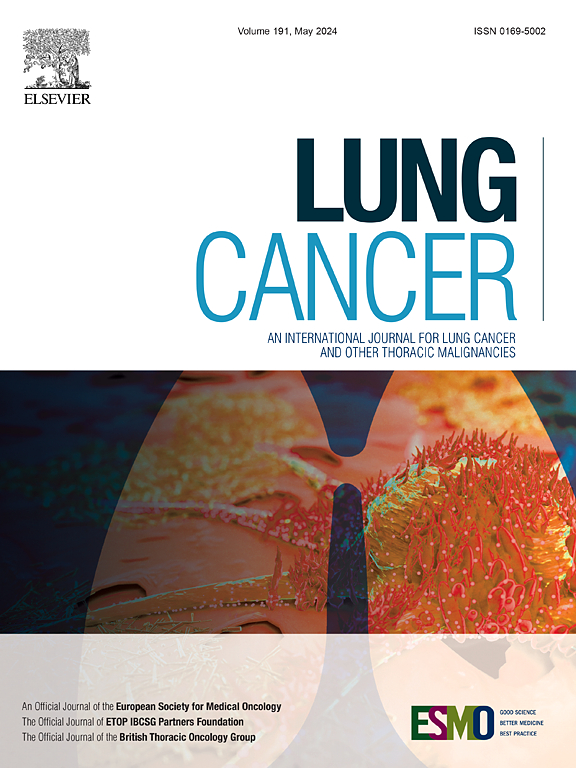人工智能在肺癌全幻灯片图像中预测EGFR突变:系统回顾和荟萃分析
IF 4.5
2区 医学
Q1 ONCOLOGY
引用次数: 0
摘要
表皮生长因子受体(EGFR)突变在指导肺癌的靶向治疗中起着关键作用,因此准确检测EGFR突变对于个性化治疗至关重要。最近,人工智能(AI)已经成为从数字病理图像中识别EGFR突变状态的有前途的工具。本系统综述和荟萃分析评估了AI模型在预测肺癌患者全幻灯片图像(WSIs)中EGFR突变的诊断准确性。方法综合检索EMBASE、PubMed、Web of Science和Scopus四个数据库,检索截止到2024年6月20日发表的研究。包括使用人工智能算法(包括机器学习和深度学习技术)从数字病理图像中预测EGFR突变的研究。使用QUADAS-AI工具评估偏倚风险和适用性问题。提取诊断准确性指标,如敏感性、特异性和曲线下面积(AUC)。采用随机效应模型综合人工智能模型的性能。本研究已在PROSPERO注册(CRD42024570496)。结果在1828项确定的研究中,16项符合纳入标准,其中4项符合meta分析。汇总结果表明,AI算法的AUC为0.756 (95% CI: 0.669-0.824),灵敏度为66.3% (95% CI: X-Y),特异性为68.1% (95% CI: X-Y)。亚组分析显示,使用内部数据集、手术切除样本、ResNet架构和肿瘤聚焦区域的人工智能模型表现出更好的预测性能。结论ai模型显示了利用WSIs无创预测肺癌患者EGFR突变的潜力,尽管目前的准确性和精度有待进一步改进。未来的研究应旨在增强人工智能算法,验证更大数据集上的发现,并将这些工具整合到临床工作流程中,以优化肺癌管理。本文章由计算机程序翻译,如有差异,请以英文原文为准。
Artificial intelligence in predicting EGFR mutations from whole slide images in lung Cancer: A systematic review and Meta-Analysis
Background
Epidermal growth factor receptor (EGFR) mutations play a pivotal role in guiding targeted therapy for lung cancer, making their accurate detection essential for personalized treatment. Recently, artificial intelligence (AI) has emerged as a promising tool for identifying EGFR mutation status from digital pathology images. This systematic review and meta-analysis evaluate the diagnostic accuracy of AI models in predicting EGFR mutations from whole slide images (WSIs) in lung cancer patients.
Methods
A comprehensive search was conducted across four databases (EMBASE, PubMed, Web of Science, and Scopus) for studies published up to June 20th, 2024. Studies employing AI algorithms, including machine learning and deep learning techniques, to predict EGFR mutations from digital pathology images were included. The risk of bias and applicability concerns were assessed using the QUADAS-AI tool. Diagnostic accuracy metrics such as sensitivity, specificity, and the Area Under the Curve (AUC) were extracted. Random-effects models were applied to synthesize the AI model performance. This study is registered with PROSPERO (CRD42024570496).
Results
Out of 1,828 identified studies, 16 met the inclusion criteria, with 4 eligible for meta-analysis. The pooled results demonstrated that AI algorithms achieved an AUC of 0.756 (95% CI: 0.669–0.824), a sensitivity of 66.3% (95% CI: X–Y), and a specificity of 68.1% (95% CI: X–Y). Subgroup analyses revealed that AI models using in-house datasets, surgical resection samples, the ResNet architecture, and tumor-focused regions exhibited improved predictive performance.
Conclusion
AI models exhibit potential for non-invasive prediction of EGFR mutations in lung cancer patients using WSIs, although current accuracy and precision warrant further refinement. Future research should aim to enhance AI algorithms, validate findings on larger datasets, and integrate these tools into clinical workflows to optimize lung cancer management.
求助全文
通过发布文献求助,成功后即可免费获取论文全文。
去求助
来源期刊

Lung Cancer
医学-呼吸系统
CiteScore
9.40
自引率
3.80%
发文量
407
审稿时长
25 days
期刊介绍:
Lung Cancer is an international publication covering the clinical, translational and basic science of malignancies of the lung and chest region.Original research articles, early reports, review articles, editorials and correspondence covering the prevention, epidemiology and etiology, basic biology, pathology, clinical assessment, surgery, chemotherapy, radiotherapy, combined treatment modalities, other treatment modalities and outcomes of lung cancer are welcome.
 求助内容:
求助内容: 应助结果提醒方式:
应助结果提醒方式:


